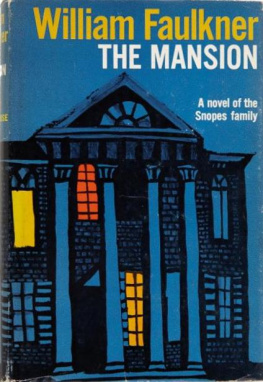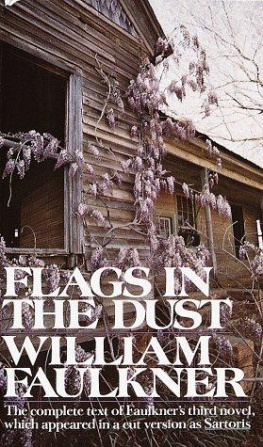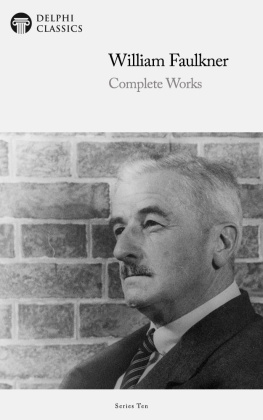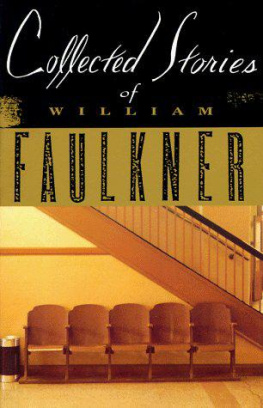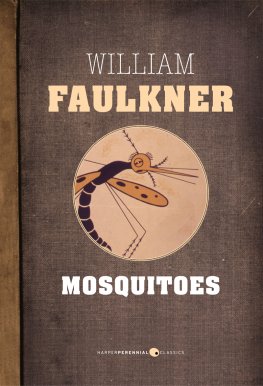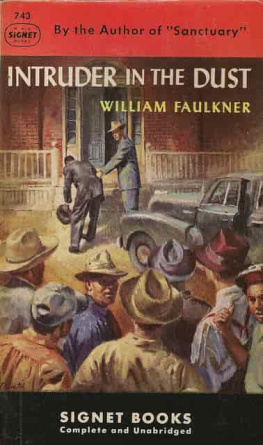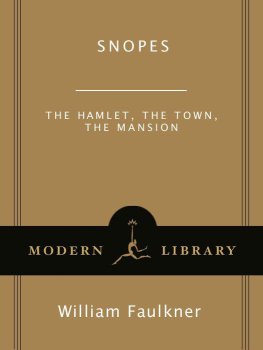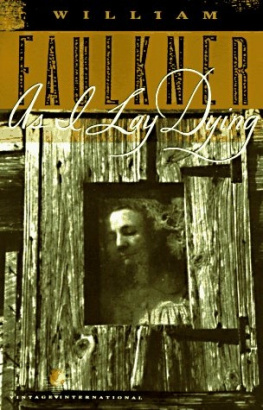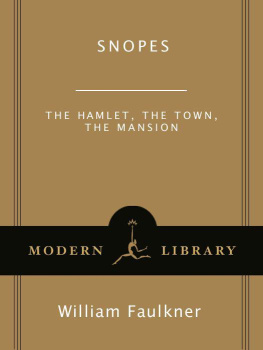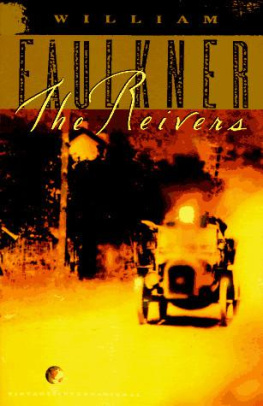William Faulkner - The Mansion
Here you can read online William Faulkner - The Mansion full text of the book (entire story) in english for free. Download pdf and epub, get meaning, cover and reviews about this ebook. year: 1965, publisher: Vintage, genre: Adventure. Description of the work, (preface) as well as reviews are available. Best literature library LitArk.com created for fans of good reading and offers a wide selection of genres:
Romance novel
Science fiction
Adventure
Detective
Science
History
Home and family
Prose
Art
Politics
Computer
Non-fiction
Religion
Business
Children
Humor
Choose a favorite category and find really read worthwhile books. Enjoy immersion in the world of imagination, feel the emotions of the characters or learn something new for yourself, make an fascinating discovery.
- Book:The Mansion
- Author:
- Publisher:Vintage
- Genre:
- Year:1965
- Rating:3 / 5
- Favourites:Add to favourites
- Your mark:
- 60
- 1
- 2
- 3
- 4
- 5
The Mansion: summary, description and annotation
We offer to read an annotation, description, summary or preface (depends on what the author of the book "The Mansion" wrote himself). If you haven't found the necessary information about the book — write in the comments, we will try to find it.
The Mansion — read online for free the complete book (whole text) full work
Below is the text of the book, divided by pages. System saving the place of the last page read, allows you to conveniently read the book "The Mansion" online for free, without having to search again every time where you left off. Put a bookmark, and you can go to the page where you finished reading at any time.
Font size:
Interval:
Bookmark:
William Faulkner
The Mansion
Volume Three of the Snopes Trilogy
First published in 1959
The Mansion
This book is the final chapter of, and the summation of, a work conceived and begun in 1925. Since the author likes to believe, hopes that his entire life's work is a part of a living literature, and since "living" is motion, and "motion" is change and alteration and therefore the only alternative to motion is un-motion, stasis, death, there will be found discrepancies and contradictions in the thirty-four-year progress of this particular chronicle; the purpose of this note is simply to notify the reader that the author has already found more discrepancies and contradictions than he hopes the reader willcontradictions and discrepancies due to the fact that the author has learned, he believes, more about the human heart and its dilemma than he knew thirty-four years ago; and is sure that, having lived with them that long time, he knows the characters in this chronicle better than he did then.
W. F.
Mink
ONE
The jury said "Guilty" and the Judge said "Life" but he didn't hear them. He wasn't listening. In fact, he hadn't been able to listen since that first day when the Judge banged his little wooden hammer on the high desk until he, Mink, dragged his gaze back from the far door of the courtroom to see what in the world the man wanted, and he, the Judge, leaned down across the desk hollering: "You, Snopes! Did you or didn't you kill Jack Houston?" and he, Mink, said, "Dont bother me now. Cant you see I'm busy?" then turned his own head to look again toward the distant door at the back of the room, himself hollering into, against, across the wall of little wan faces hemming him in: "Snopes! Flem Snopes! Anybody here that'll go and bring Flem Snopes! I'll pay youFlem'll pay you!"
Because he hadn't had time to listen. In fact, that whole first trip, handcuffed to the deputy, from his jail cell to the courtroom, had been a senseless, a really outrageously foolish interference with and interruption, and each subsequent daily manacled trip and transference, of the solution to both their problemshis and the damned law's bothif they had only waited and let him alone: the watching, his dirty hands gripping among the grimed interstices of the barred window above the street, which had been his one, his imperious need during the long months between his incarceration and the opening of the Court.
At first, during the first few days behind the barred window, he had simply been impatient with his own impatience andyes, he admitted ithis own stupidity. Long before the moment came when he had had to aim the gun and fire the shot, he knew that his cousin Flem, the only member of his clan with the power to and the reason to, or who could at least be expected to, extricate him from its consequences, would not be there to do it. He even knew why Flem would not be there for at least a year; Frenchman's Bend was too small: everybody in it knew everything about everybody else; they would all have seen through that Texas trip even without the hurrah and hullabaloo that Varner girl had been causing ever since she (or whoever else it was) found the first hair on her bump, not to mention just this last past spring and summer while that durn McCarron boy was snuffing and fighting everybody else off exactly like a gang of rutting dogs.
So that long before Plem married her, he, Mink, and everybody else in ten miles of the Bend knew that old Will Varner was going to have to marry her off to somebody, and that quick, if he didn't want a woods colt in his back yard next grass. And when it was Flem that finally married her, he, Mink, anyway was not surprised. It was Flem, with his usual luck. All right, more than just luck then: the only man in Frenchman's Bend that ever stood up to and held his own with old Will Varner; that had done already more or less eliminated Jody, old Will's son, out of the store, and now was fixing to get hold of half of all the rest of it by being old Will's son-in-law. That just by marrying her in time to save her from dropping a bastard, Flem would not only be the rightful husband of that damn girl that had kept every man under eighty years old in Frenchman's Bend in an uproar ever since she was fifteen years old by just watching her walk past, but he had got paid for it to boot: not only the right to fumble his hand every time the notion struck him under that dress that rutted a man just thinking even about somebody else's hand doing it, but was getting a free deed to that whole Old Frenchman place for doing it.
So he knew Flem would not be there when he would need him, since he knew that Flem and his new wife would have to stay away from Frenchman's Bend at least long enough for what they would bring back with them to be able to call itself only one month old without everybody that looked at it dying of laughing. Only, when the moment finally came, when the instant finally happened when he could no longer defer having to aim the gun and pull the trigger, he had forgot that. No, that was a lie. He hadn't forgot it. He simply could wait no longer: Houston himself would not let him wait longer--and that too was one more injury which Jack Houston hi the very act of dying, had done him: compelled him, Mink, to kill him at a time when the only person who had the power to save him and would have had to save him whether he wanted to or not because of the ancient immutable laws of simple blood kinship, was a thousand miles away; and this time it was an irreparable injury because in the very act of committing it, Houston had escaped forever all retribution for it.
He had not forgotten that his cousin would not be there. He simply couldn't wait any longer. He had simply had to trust them the Them of whom it was promised that not even a sparrow should fall unmarked. By them he didn't mean that whatever-it-was that folks referred to as Old Moster. He didn't believe in any Old Moster. He had seen too much in his time that, if any Old Moster existed, with eyes as sharp and power as strong as was claimed He had, He would have done something about. Besides, he, Mink, wasn't religious. He hadn't been to a church since he was fifteen years old and never aimed to go againplaces which a man with a hole in his gut and a rut in his britches that he couldn't satisfy at home, used, by calling himself a preacher of God, to get conveniently together the biggest possible number of women that he could tempt with the reward of the one in return for the job of the otherthe job of filling his hole in payment for getting theirs plugged the first time the husband went to the field and she could slip off to the bushes where the preacher was waiting; the wives coming because here was the best market they knowed of to swap a mess of fried chicken or a sweet-potato pie; the husbands coming not to interrupt the trading because the husband knowed he couldn't interrupt it or even keep up with it, but at least to try and find out if his wife's name would come to the head of the waiting list today or if maybe he could still finish scratching that last forty before he would have to tie her to the bedpost and hide behind the door watching; and the young folks not even bothering to enter the church a-tall for already running to be the first couple behind the nearest handy thicket bush.
He meant, simply, that them theyit , whichever and whatever you wanted to call it, who represented a simple fundamental justice and equity in human affairs, or else a man might just as well quit; the they, them, it , call them what you like, which simply would not, could not harass and harry a man forever without some day, at some moment, letting him get his own just and equal licks back in return. They could harass and worry him, or they could even just sit back and watch everything go against him right along without missing a lick, almost like there was a pattern to it; just sit back and watch and (all right, why not? hea mandidn't mind, as long as he was a man and there was a justice to it) enjoy it too; maybe in fact They were even testing him, to see if he was a man or not, man enough to take a little harassment and worry and so deserve his own licks back when his turn came. But at least that moment would come when it was Ms turn, when he had earned the right to have his own just and equal licks back, just as They had earned the right to test him and even to-enjoy the testing; the moment when they would have to prove to him that They were as much a man as he had proved to Them that he was; when he not only would have to depend on Them but had won the right to depend on Them and find Them faithful; and They dared not, They would not dare, to let him down, else it would be as hard for Them to live with themselves afterward as it had finally become for him to live with himself and still keep on taking what he had taken from Jack Houston.
Font size:
Interval:
Bookmark:
Similar books «The Mansion»
Look at similar books to The Mansion. We have selected literature similar in name and meaning in the hope of providing readers with more options to find new, interesting, not yet read works.
Discussion, reviews of the book The Mansion and just readers' own opinions. Leave your comments, write what you think about the work, its meaning or the main characters. Specify what exactly you liked and what you didn't like, and why you think so.

